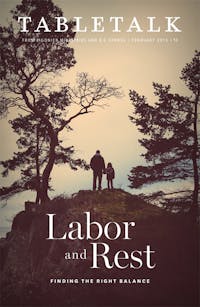
Request your free, three-month trial to Tabletalk magazine. You’ll receive the print issue monthly and gain immediate digital access to decades of archives. This trial is risk-free. No credit card required.
Try Tabletalk NowAlready receive Tabletalk magazine every month?
Verify your email address to gain unlimited access.
Though it comes rather early in the story, I am convinced that Genesis 3:15 is not just the hinge of the Bible, but it is the very hinge of history. It is there that God responds to the serpent’s assault on Eden, promising that the seed of the woman would one day, at a terrible cost, crush the head of the serpent. This is God’s solemn declaration of war. The great war will last from that pregnant moment to the end of history when death, the last enemy, will be destroyed. Which means, of course, that today we are at war.
There is no option for peace. Indeed, in that same garden scene where God declares war on the serpent, He makes a startling announcement—that God will find and draft the soldiers for His army not from a mass of neutral humanity. Rather, God will pluck soldiers out of the devil’s army to serve in God’s army. He promises, “I will put enmity between you and the woman, between your seed and her seed.” We are therefore, as long as we are alive, fighting on one side or the other.
Well, that’s almost true. When we fought against the Lord and His anointed, we were indeed engaged in warfare twenty-four-seven. When, however, by His sovereign grace we are brought into His army, we now battle twenty-four-six. One day in seven, we enter into His rest.
I see this principle at work in a rather surprising place: Psalm 23. This great psalm of David has been a comfort and an encouragement to God’s people since David, under the inspiration of the Holy Spirit, penned it more than three thousand years ago. It begins with a rather bucolic scene, with a touching description of the lamb’s satisfaction in his Shepherd alone, and turns to the myriad ways the Great Shepherd cares for His lamb. There are still waters, green grass, and paths of righteousness. There is a reprieve from the fears of the outside world, for He is with us.
Suddenly, however, the nature of the scene seems to change. Now we are no longer in a lush countryside but are preparing for war. We seem to look across the future battlefield at our most hated enemies. Their armor is shined, their bows strung. Their warhorses strain against their halters. Slowly, we begin to descend into the valley of war, at first with tentative steps as the enemy descends to the opposite hillside. Our pace quickens as we move into marching, and soon we march double time into the coming maelstrom. As the two armies draw closer, the soldiers on each side draw their weapons, moving toward that first terrible clatter of steel against steel, toward the drawing of first blood. At just that moment, a split second before arrows fly and swords swoop our Captain, our Hero gives His signal. He directs us to sit, to rest, to eat at His table.
Our enemies froth and fume. They vainly swing their blades. They bend under the weight of their weapons. And we rest, safe, secure, and untouchable. For we are no longer in the battle. We have been taken to another place and another time. We dine with the king. We enter, when we come to His table, the true and eternal Mount Zion. We feast at the marriage feast of the Lamb. We rest.
When we turn the Sabbath into a set of rules of what we are allowed and forbidden to do, I fear we miss the whole spirit of the day. The rest to which we are called is less resting from our day-to-day jobs than it is rest from the battle. We are able to rest because we know He has already won. Sabbath is the good cheer to which we are called, knowing He has already overcome the world (John 16:33).
When we enter more fully into our rest, when we sit at His table, untouchable, victorious, are we not overcome with joy? Is it not true that our heads are anointed with oil, that our cups runneth over? Like soldiers who come home for rest and relaxation, we soldiers of the King are invited to go home, so that when we return to battle, we know where we are going. We drink deeply of His goodness so that we know that His goodness and mercy will follow us all the days of our lives. We go back into the battle knowing, having been to and tasted the end of all things, that we will indeed dwell in the house of the Lord forever.
This is rest indeed because for six days a week we are at war indeed. The great irony, however, is that the more we rest, the more we battle. For it is our worship, our rest, our joy, and our peace that are the very weapons of our warfare. By joy, towers are toppled. By peace, ramparts are ruined. By singing forth the glory of His name, by heralding His glory, walls come tumbling down. We fight in peace because the war has already been won. We die in war because the peace has already been won. This is His kingdom that we seek.
